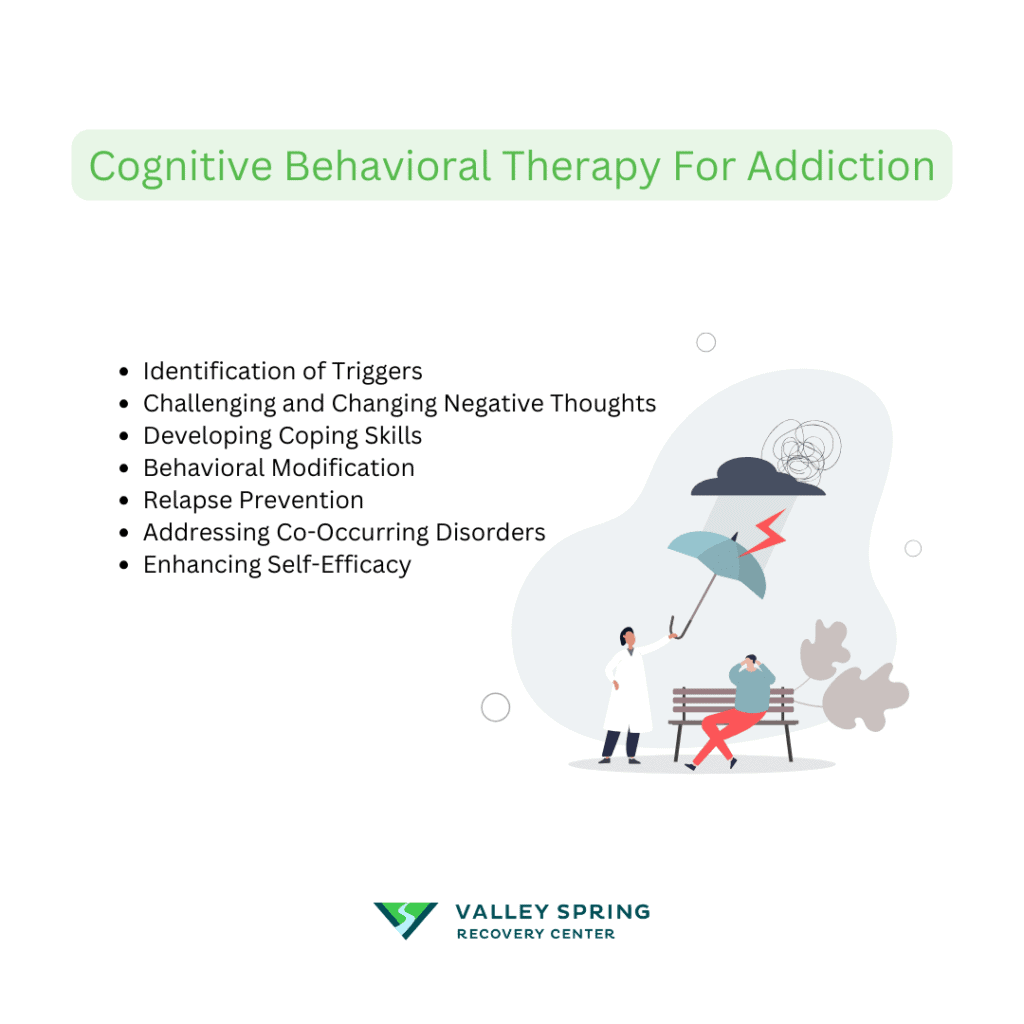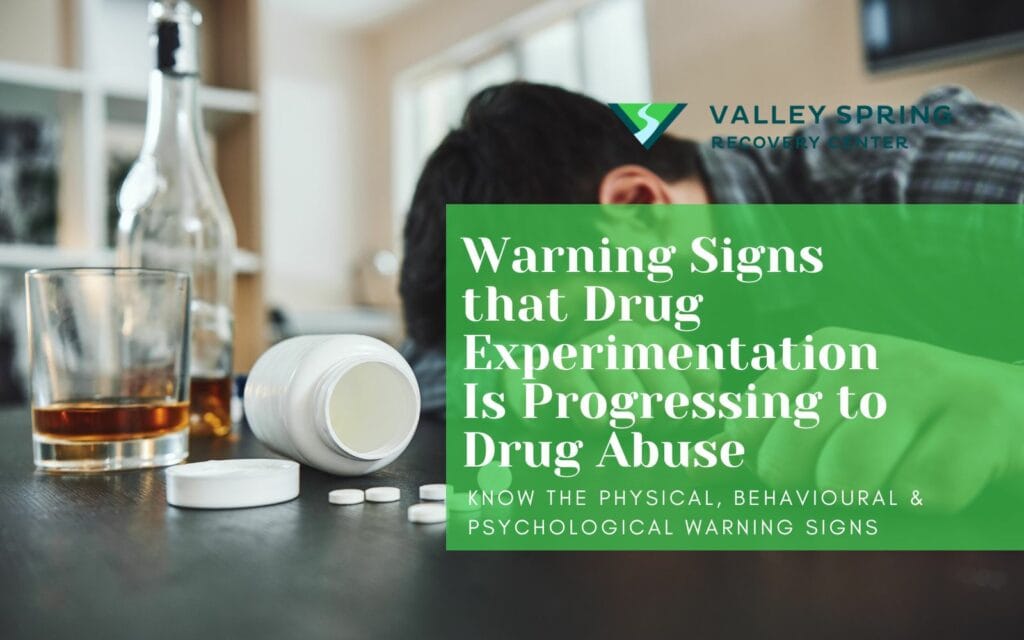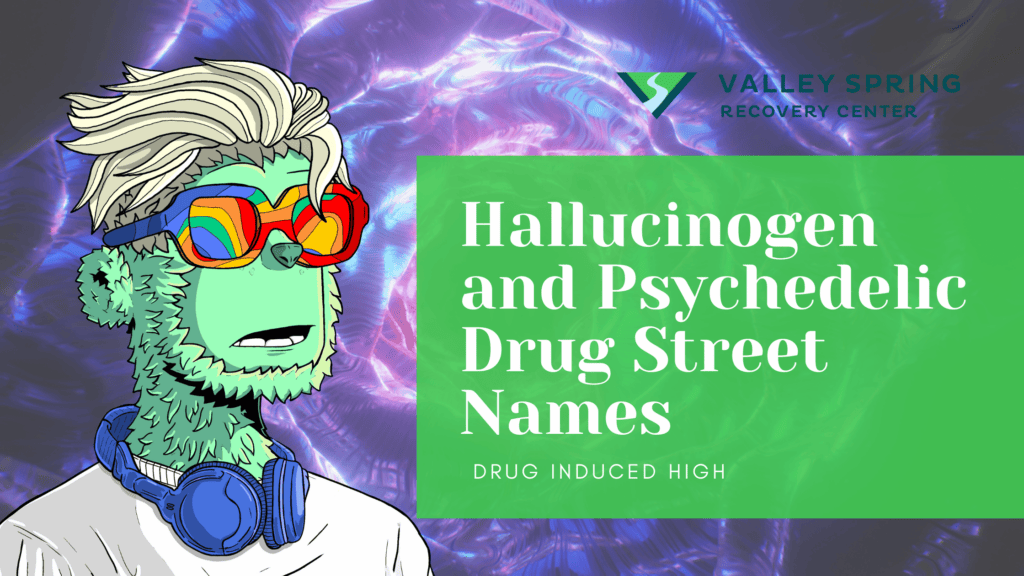At Valley Spring Recovery Center in New Jersey, we incorporate Cognitive Behavioral Therapy (CBT) as a key component of our addiction treatment programs. CBT is a form of psychotherapy that focuses on identifying and addressing negative thought patterns and behaviors, which are often at the core of substance addiction.
During CBT sessions at Valley Spring, individuals engage in a structured recovery program under the guidance of experienced psychotherapists, therapists, or mental health counselors. These sessions, which are an integral part of the recovery journey, involve numerous behavioral modification therapy meetings.
CBT is instrumental in helping individuals recognize and alter harmful thinking and behavioral patterns.
What is Cognitive Behavioral Therapy?
Cognitive Behavioral Therapy (CBT) is a highly effective, evidence-based psychological treatment that focuses on identifying and modifying negative thought patterns and behaviors that contribute to emotional distress and mental health issues. Originating in the 1960s, CBT has since evolved into one of the most widely used and respected forms of psychotherapy.
At its core, CBT is based on the concept that our thoughts, feelings, and behaviors are interconnected, and that altering one can positively affect others. This therapy helps individuals understand the harmful thought patterns that influence their behaviors and emotions, equipping them with skills to alter these thoughts and develop healthier coping mechanisms.
CBT is particularly effective in treating a range of conditions, including addiction, anxiety, and depression – the primary focus areas at Valley Spring Recovery Center. By addressing the root causes of these conditions, CBT empowers individuals to break free from the cycle of negative thinking and behavior, leading to significant improvements in mental health and overall well-being.
In the following sections, we will explore how CBT is specifically applied in treating addiction, anxiety, and depression, and how our approach at Valley Spring Recovery Center makes a lasting difference in our clients’ lives.

How Does CBT Work in Addiction Treatment?
Cognitive Behavioral Therapy (CBT) in the context of addiction is a psychotherapeutic approach that addresses maladaptive patterns of thought and behavior that contribute to the development and maintenance of substance use disorders. CBT is based on the understanding that thoughts, feelings, and behaviors are interconnected and that changing negative thought patterns can lead to more positive behaviors and emotions, particularly in relation to substance use.
Key aspects of CBT in treating addiction include:
- Identification of Triggers: CBT helps individuals recognize situations, emotions, or thoughts that trigger cravings or substance use. By becoming aware of these triggers, individuals can develop strategies to avoid them or cope with them more effectively.
- Challenging and Changing Negative Thoughts: Many individuals struggling with addiction have negative or distorted thinking patterns that perpetuate substance use. CBT works to identify these harmful thoughts and replace them with more realistic and positive ones.
- Developing Coping Skills: CBT teaches practical and effective skills to manage stress, handle difficult emotions, and cope with life’s challenges without resorting to substance use.
- Behavioral Modification: CBT helps individuals modify their behaviors related to substance use. This could involve learning to refuse drugs or alcohol, developing healthier habits, or engaging in activities that are incompatible with substance use.
- Relapse Prevention: An essential component of CBT in addiction treatment is relapse prevention. This involves recognizing early warning signs of relapse and implementing strategies to maintain sobriety.
- Addressing Co-Occurring Disorders: Often, substance use disorders co-occur with other mental health conditions like anxiety or depression. CBT addresses the whole spectrum of psychological issues, understanding that treating co-occurring disorders is crucial for successful recovery from addiction.
- Enhancing Self-Efficacy: CBT empowers individuals by boosting their confidence in their ability to control their addiction and cope with challenges without substances.
Through CBT, individuals learn to recognize situations that may lead to substance use and develop coping strategies to avoid relapse. Our therapists work to equip each client with practical tools and techniques to handle stress, emotional pain, and social pressure, which are common challenges in addiction recovery.
CBT for Anxiety and Depression
Anxiety and depression are among the most common mental health disorders, often co-occurring with addiction. CBT is exceptionally effective in treating these conditions by addressing the underlying thought patterns that contribute to these emotional states.
Our therapists at Valley Spring Recovery Center help clients to challenge and reframe negative beliefs, fostering a more positive outlook on life. Through regular CBT sessions, clients learn to manage their symptoms of anxiety and depression, gaining back control and improving their overall quality of life.
What Is Our Approach to Cognitive Behavioral Therapy During Treatment?
At Valley Spring Recovery Center, we believe in a personalized approach to therapy. Our experienced therapists tailor CBT to meet the unique needs and goals of each client. We ensure that every session is client-centered, providing a safe and supportive environment for personal growth and healing.
Our team comprises highly qualified professionals passionate about delivering the highest standard of care. With their extensive experience in various therapeutic techniques, they are adept at guiding clients through their recovery journey using the most effective strategies.
Why Choose Valley Spring Recovery Center For CBT In New Jersey?
Choosing the right recovery center is crucial for successful treatment and lasting recovery. Valley Spring Recovery Center stands out for several compelling reasons:
- Accreditations and Certifications: We are proud to hold accreditations from CARF, JCAHO, and NJDCF, reflecting our commitment to the highest standards of care and professional excellence in addiction treatment.
- Google Reviews: Our dedication to providing quality care is reflected in our 20 five-star reviews on Google, showcasing the positive impact we’ve had on the lives of our clients.
- Expert Team: Our team of therapists and healthcare professionals is not only highly qualified but also deeply compassionate and dedicated to supporting each client’s unique journey.
- State-of-the-Art Facilities: Located in the serene surroundings of New Jersey, our facility offers a peaceful and conducive environment for recovery and healing.
- Holistic Approach: We believe in treating the whole person – mind, body, and spirit – and offer a range of therapies and activities to support overall well-being.
Success Stories and Testimonials
Hearing from those who’ve walked this path before can be incredibly inspiring. Our client’s success stories are a testament to the transformative power of CBT at Valley Spring Recovery Center. Here, we share some stories and testimonials that highlight the life-changing experiences of our clients who chose to make their stories public.
Valley Spring Recovery Center is a very special place. I knew from the first day I arrived that this place was different. I was immediately put at ease, and made to feel very comfortable. The facility itself is beautiful. It has large open rooms Which are decorated very nicely. I like to describe the place as having a “Happy Feel”. The center also has every amenity you could possibly need. I’ve attended other Recovery Programs Valley Spring is on a whole different level. I described the staff as “miracle workers”. The knowledge I learned through cognitive behavioral therapy and the level of care I received truly saved My life. When I could not get sober Valley Spring never gave up on me. I truly feel that Valley Spring has afforded me a new life of happiness beyond my wildest dreams. The attending psychiatrist was never short with his time and went above and beyond to make sure that your individual Treatment and plans including medication were fine-tuned to your needs The clinicians are superior and truly CARE. For the first time, I felt loved when I was lost, Lonely, and experiencing the worst period of my life. The owners of Valley Spring are really great people. They are approachable and go out of their way to do anything to help you. I have firsthand experience. Relapse was a big part of my story until I attended Valley Spring. If you want Recovery don’t sell yourself short and contact Valley Spring put the work in and you will be successful. I recently graduated from Valley Spring and I have a whole new life with a bright future ahead of me. Thank you to everyone at Valley Spring.
Thomas R.
FAQ About CBT Therapy At Valley Spring Recovery In New Jersey
What is the Difference Between CBT and EMDR?
Cognitive Behavioral Therapy (CBT) and Eye Movement Desensitization and Reprocessing (EMDR) are two distinct psychotherapeutic approaches, each with unique methodologies and applications. Understanding the differences between CBT and EMDR is crucial for individuals seeking effective treatment for mental health issues.
Cognitive Behavioral Therapy (CBT):
- Fundamental Concept: CBT operates on the principle that thoughts, emotions, and behaviors are interconnected. The therapy focuses on identifying and modifying negative thought patterns to influence emotions and behaviors positively.
- Application: CBT is versatile, effectively addressing a wide range of psychological disorders, including anxiety, depression, phobias, and stress. It is particularly beneficial for individuals seeking to change behavior patterns and develop coping strategies.
- Methodology: This therapy involves structured sessions where patients engage in identifying negative thoughts, challenging them, and replacing them with constructive ones. Techniques like journaling, cognitive restructuring, and problem-solving are commonly employed.
- Duration and Focus: CBT is typically time-limited and focused on present issues rather than past experiences.
Eye Movement Desensitization and Reprocessing (EMDR):
- Fundamental Concept: EMDR is specifically designed to alleviate the distress associated with traumatic memories. It utilizes bilateral sensory input to process these memories, reducing their emotional impact.
- Application: EMDR is highly effective in treating post-traumatic stress disorder (PTSD) and other trauma-related conditions. It is especially suited for individuals who have experienced traumatic events and are struggling with their lasting effects.
- Methodology: The therapy involves recalling traumatic events while simultaneously receiving bilateral sensory input, such as side-to-side eye movements, hand tapping, or auditory tones. This process is believed to facilitate the brain’s natural healing abilities.
- Duration and Focus: EMDR is more focused on processing and integrating past traumatic memories than on present-day thought patterns.
CBT is a broad-spectrum therapy aimed at altering negative thoughts and behaviors, EMDR is tailored towards processing and healing from traumatic experiences. The choice between CBT and EMDR should be based on the individual’s specific psychological needs, the nature of their issues, and the therapeutic goals they aim to achieve. Both therapies require guidance from trained professionals and are supported by extensive research validating their effectiveness.
How is CBT incorporated with MAT during treatment?
Cognitive Behavioral Therapy (CBT) and Medication-Assisted Treatment (MAT) are often combined to create a comprehensive approach to addiction treatment. Here’s how they are integrated during treatment:
-
Dual Approach: CBT focuses on changing harmful thought patterns and behaviors related to substance use, while MAT uses medications to address the biological aspects of addiction. This dual approach addresses both the psychological and physiological components of addiction.
-
CBT for Behavioral Change: CBT helps patients identify and challenge negative thoughts and behaviors that lead to substance use. It equips them with coping strategies to deal with triggers and cravings, aiming to reduce the likelihood of relapse.
-
MAT for Craving and Withdrawal Management: Medications used in MAT, like methadone, buprenorphine, or naltrexone, help manage withdrawal symptoms and cravings. This physiological support can make it easier for patients to engage in CBT as they are less preoccupied with these symptoms.
-
Integrated Sessions: During treatment, healthcare providers often integrate CBT sessions with MAT. Patients may receive CBT while they are undergoing MAT to ensure a coordinated approach to treatment.
-
Improving Treatment Adherence: CBT can also be used to encourage adherence to MAT. By addressing underlying behaviors and thought patterns, CBT can help patients understand the importance of sticking to their medication regimen.
-
Handling Relapse: If a patient experiences a relapse, CBT can be instrumental in understanding the triggers that led to it. The therapist can then work with the patient to strengthen coping strategies, while MAT can be adjusted to better manage cravings.
-
Holistic Recovery Plan: The combination of CBT and MAT allows for a more holistic recovery plan. CBT addresses the mental health aspect of addiction, while MAT targets physical dependency, providing a well-rounded approach to recovery.
-
Tailored to Individual Needs: The specific combination of CBT techniques and MAT medications can be tailored to meet the unique needs of each patient, considering factors like the type of substance used, the severity of addiction, and the presence of any co-occurring disorders.
By integrating CBT with MAT, treatment providers can offer a more comprehensive and effective approach to addiction treatment, addressing both the mind and the body. This combination is often seen as best practice in the treatment of opioid use disorder and other forms of substance dependence.
Do the therapists incorporate CBT in all levels of care?
At our treatment center, Cognitive Behavioral Therapy (CBT) is not just a component of our approach; it is the cornerstone that underpins all levels of our care. Recognizing the profound impact of CBT, we have meticulously integrated it across various stages of treatment, ensuring a consistent and effective therapeutic experience for our clients.
-
Partial Hospitalization Program (PHP): In the Partial Hospitalization Program setting, CBT plays a pivotal role. Here, clients engage in intensive therapy sessions while enjoying a structured, yet less restrictive, environment compared to inpatient care. CBT in PHP focuses on addressing deeper behavioral patterns and cognitive distortions that contribute to substance use, providing clients with robust tools to manage and overcome these challenges.
-
Intensive Outpatient Program (IOP): As clients transition to the IOP level, CBT remains a central element of treatment. In this phase, the focus is on reinforcing the skills learned in PHP and applying them in real-world scenarios. Clients continue to delve into CBT strategies, enhancing their ability to cope with daily stressors and triggers in a less controlled environment.
-
Outpatient Program (OP): In the OP stage, CBT continues to support clients as they gain more independence. The therapy sessions in OP are tailored to ensure that clients maintain the progress they’ve achieved and continue to build upon their coping strategies. This level of care is crucial for the long-term maintenance of sobriety and mental well-being.
In summary, CBT is a fundamental aspect of our treatment philosophy, seamlessly woven into each level of care we offer. From the intensity of PHP to the gradual autonomy of IOP and OP, CBT provides a consistent therapeutic thread, guiding our clients toward recovery and empowering them with essential skills for a healthier, more balanced life.
Get Started with CBT For Addiction Treatment In New Jersey
If you or a loved one is struggling with addiction, anxiety, or depression, we invite you to reach out to us. Starting with CBT at Valley Spring Recovery Center is a step towards a brighter, healthier future. Contact us to schedule a consultation and learn more about how we can help you on your journey to recovery.



